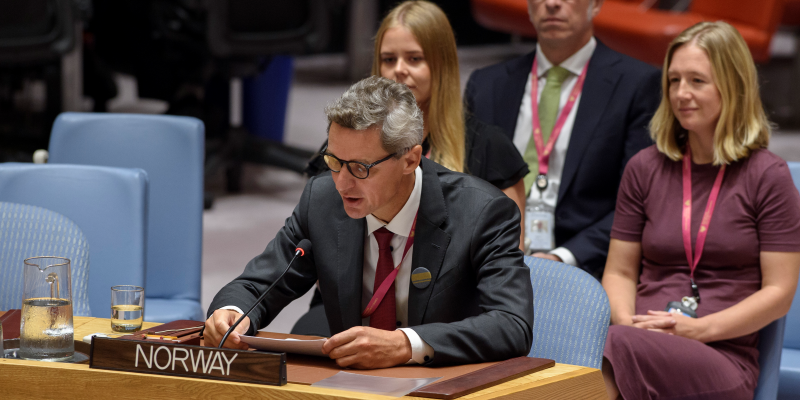Mr President, I have the honour to speak on behalf of the five Nordic countries: Denmark, Finland, Iceland, Sweden and my own country, Norway.
First, we wish to thank the UK for organising this open debate. With an increase in the number of conflicts and their negative impact on international peace, security and development, it is more important than ever that we are successful in preventing and resolving conflicts through mediation.
Solving disputes by peaceful means remains the primary responsibility of Member States. At the same time, the Security Council has an important role. We welcome the fact that last year, a united Council, in concert with other stakeholders, contributed to the prevention of a potential outbreak of violence in the Gambia.
In line with the UN Charter, the Security Council may call upon parties to disputes to settle them by peaceful means and may recommend appropriate procedures for such settlements. The Nordic countries encourage the Council to make full use of its mandate to engage in, support and promote mediation efforts, as it did by providing united and clear support for the Colombia peace process. In the Colombian case we also see the crucial role a UN mission, backed by a strong UN Security Council mandate, can play once a peace agreement has been signed, when the parties embark on the difficult phase of implementing what was agreed.
The ‘sustaining peace’ agenda highlights the importance of engagement throughout the conflict cycle. At the same time, the increasing complexity of today’s conflicts poses challenges for the UN’s peacemaking efforts. There is a complex relationship between sanctions and peace processes. The involvement of the Council brings with it a responsibility to provide active support for peace efforts and to help consolidate peace. We hope the Council will pay closer attention to this dimension in situations where there have been positive developments, for example in the relationship between Eritrea and Ethiopia, and between Eritrea and Somalia.
The Nordic countries recognise that regional organisations are often best placed to take the lead in mediation efforts. We welcome and will support in every way possible the strengthened relationship between the AU and UN and between the PSC and the Security Council.
The Nordic countries are concerned about the low number of women participating in mediation processes. We support the Secretary-General in his efforts to rectify this, and we hope that the emerging cooperation between the regional networks of women mediators and the UN will lead to more inclusive peace processes, thus increasing the likelihood of sustainable peace. The Nordic Women Mediators network was established in 2015.
We fully support the Secretary-General’s call for a surge in peace diplomacy. We welcome and have contributed to the increase in funding for mediation and early preventive efforts by the Department of Political Affairs in recent years. At the same time, sustained and predictable funding is required – and not only on a voluntary basis.
As the HIPPO report underscored, the Council’s efforts to manage conflicts should be tailored to support political solutions to conflicts. We support the UN reform agenda and look forward to seeing how the ‘whole-of-pillar approach’ by the UN peace and security secretariat will lead to an enhanced role for mediation in peacekeeping and peacebuilding.
However, mediation is not a quick fix nor a one-size-fits-all approach. Social and economic development remains crucial if we are to address root causes. While supporting the UN’s mediation capabilities, the Nordic countries will remain major partners in long-term development.
Thank you.
